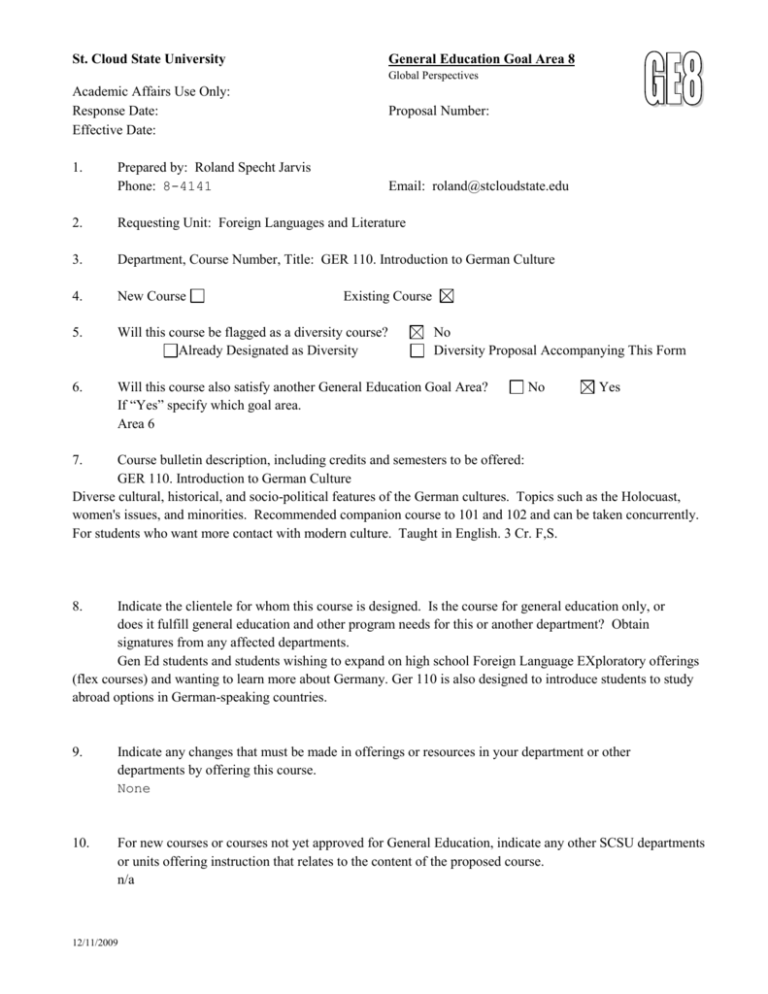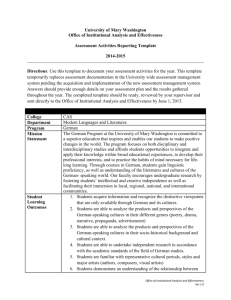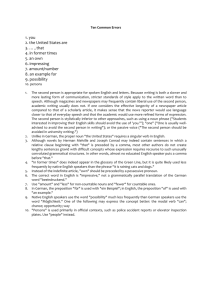GE-10-185. GER 110. Introduction to German Culture
advertisement

St. Cloud State University General Education Goal Area 8 Global Perspectives Academic Affairs Use Only: Response Date: Effective Date: 1. Proposal Number: Prepared by: Roland Specht Jarvis Phone: 8-4141 Email: roland@stcloudstate.edu 2. Requesting Unit: Foreign Languages and Literature 3. Department, Course Number, Title: GER 110. Introduction to German Culture 4. New Course 5. Will this course be flagged as a diversity course? Already Designated as Diversity 6. Will this course also satisfy another General Education Goal Area? If “Yes” specify which goal area. Area 6 Existing Course No Diversity Proposal Accompanying This Form No Yes 7. Course bulletin description, including credits and semesters to be offered: GER 110. Introduction to German Culture Diverse cultural, historical, and socio-political features of the German cultures. Topics such as the Holocuast, women's issues, and minorities. Recommended companion course to 101 and 102 and can be taken concurrently. For students who want more contact with modern culture. Taught in English. 3 Cr. F,S. 8. Indicate the clientele for whom this course is designed. Is the course for general education only, or does it fulfill general education and other program needs for this or another department? Obtain signatures from any affected departments. Gen Ed students and students wishing to expand on high school Foreign Language EXploratory offerings (flex courses) and wanting to learn more about Germany. Ger 110 is also designed to introduce students to study abroad options in German-speaking countries. 9. Indicate any changes that must be made in offerings or resources in your department or other departments by offering this course. None 10. For new courses or courses not yet approved for General Education, indicate any other SCSU departments or units offering instruction that relates to the content of the proposed course. n/a 12/11/2009 11. Courses designated as General Education are included in the assessment plan for the Goal Area(s) for which they are approved. Courses for which assessment is not included in the annual GE assessment report for two years will be removed from the General Education Program. The Requesting Unit understands and recognizes the above conditions. 12. Provide a concise explanation of how the following goal is a “significant focus” of the proposed course. Goal Area 8: Global Perspectives Develop a comparative perspective and understanding of one’s place in a global context. Global perspectives are not only a significant focus, but the underpinnings of the entire course. Each of the items on the syllabus contribute toward the global perspectives goals. Specifically "The Creation of Germany" takes a longitudinal approach to global identity development and allows students to uncover and analyse the inter-connectedness of Scandinavian, Germanic, and Eastern cultures. While only one header on the syllabus spells out the words "global context", the other topics serve the same theme. "Germany's role in the creation of modern social structures" uses examples from university developments in Italy and the Netherlands 100 years prior to the formation of German universities in the 14th century. Germany's first universities were patterned on global examples. "Immigration: Economic, religious, political reasons for immigration" looks to the sender countries of an emerging international workforce in Germany, beginning in the early 60ies. Cultural oppression, economic exploitation, and social hardship characterized the first waves of foreign workers. Yet they laid the foundation for a 15% share of non-German workers in Germany today. Their contributions to Germany as a multi-cultural country will also inform students' assessment of the role of immigration and migration for global perspectives. 13. In order for a course to be designated as fulfilling Goal Area 8, it must address at least 4 of the 5 student learning outcomes (SLOs) below. Check the SLOs below that are focused on in the proposed general education course. 1. Explain how they are connected and related to people elsewhere in the world. 2. Describe similarities and differences among global places and populations. 3. Analyze how political, economic or cultural elements influence relations among the world’s states, peoples, or societies. 4. Analyze specific international issues and propose and evaluate responses. 5. Articulate a vision of their individual roles and responsibilities in a common global future. 14. Discuss how each Student Learning Outcome checked above is achieved in this course. (Note: Although 12/11/2009 descriptions of typical assignments or types of assignments may be part of this discussion, it is not appropriate to submit copies of actual assignments.) Foreign Language courses are designed to enable student learning about linguistic systems, discourses current and past, literary, political and cultural topics. When the focus is on language learning, courses are taught in the target language. Ger 110, however, will be taught in English and limit time spent on language learning. The cultural similarities and differences between German speaking countries, and the home culture will be isolated, and students will broaden their understanding of the world as a patchwork of dissimilar outlooks, values, and practices. The development of European universities will serve as a starting point for this learning process, as will the language learning elements, and the focus on UNESCO World Heritage sites. Students will be able to discern common Anglo and Germanic roots in language and culture, develop appreciation and continued interest in World Heritage, global arts, and means of communication. They will express learning outcomes in writing on class blogs, scripted dialogue in front of peers, and group presentations. 2. The most significant difference between Germanic and Anglo cultures and political structures is the historical federal blueprint of lands in the center of Europe. Students will analyse and describe the evolving German speaking areas of Europe since Charlemagne and contrast their findings with French, English, and ancient centralized systems (Roman Empire, French cenralism). They will draw conclusions comparing German to US federalism, capture the essence of societies based on acristrocratic heritage, and those of federal provenience. Students will be able to explore German speaking countries better due to the language crash course built into the course design, focussing on travel and sight-seeing needs. 3. Students will use mostly English in expressing SLOs geared toward political, economic, and cultural elements. Results will be logged in blogs, and peer reviewed by classmates, as well as graded. Inherent in the study of a foreign language and culture is the analysis of relations among the world's states, peoples, and societies. Ger 110 takes a hybrid approach with respect to culture and language learning, and meets the expectations of SLO 3 with facility. 4. The syllabus provided demonstrates SLO 4 in several key ways. (Germany's role in the creation of modern social structures, sub-goal German universities; German sciences, technology, and manufacturing within "Contributions to Humanities, Arts, and Sciences," and the example of the development of the city of Berlin in the last syllabus chapter Visiting German speaking countries; World Heritage sites will serve as additional examples). Responses will be blogged and disseminated to all course participants, and enable and foster dialogue about responses. 12/11/2009 5. Students will undertake initial language learning steps. This will change their vision of their own role in a global context, and allow them to develop a sense of responsibility for local versus global issues. In order to articulate a vision, there needs to be a means of communicating the vision. Besides English, students will use other languages, or parts thereof to meet SLO 5. 15. List or attach the Course Outline (adequately described and including percentage of time to be allocated to each topic). Curriculum Committees may request additional information. Topics larger than 20% need to be broken down further. Indicate in your course outline where the Student Learning Outcomes checked above are being met. Topics: 20% The Creation of “Germany” • 800-2010 From Charlemagne to member state of the EU • Viking language and culture in Schleswig • Austro-Hungarian influences for German-speaking cultures • French, Russian, and English impact on German politics, history, and language • Shaping of the European map with Germany at its center (Area 8 SLO 2) • Interconnectedness of central European cultures and traditions and current interactions 15%Germany’s role in the creation of modern social structures • German universities: the second wave of European universities in the 14th century and universities today (Area 8 SLO 1, 4, 5) • The Hanseatic League, trade organizations, unions, today’s unions • Dual job training today: the German model for blue and white collar job training (Area 8 SLO 3) 25%Contributions to Humanities, Arts, and Sciences [Area 6 SLO 1, 2, 3, 4, 5, 6, 7] * German art, media, literature, and print technology 15% • Invention of movable print letters and the impact on European culture • Literacy, Education, from noble privilege to universal schooling • From Court literature to Romanticism, and New Objectivity to blogs • Revolutions in art, film, music, theater, architecture, and theology (Martin Luther) 12/11/2009 • Contemporary pop culture *German sciences, technology and manufacturing 10% (Area 8, SLO 4, 5) • Famous inventors and scientists and their impact of the world of science • German engineering: the automobile’s place in German culture 25% Germany's position in a global context: emigration, minorities, and cultural identity • Historical view : German imperialism German colonialism: identity and historic parameters 10% Jewish influence in German business and culture, the Shoah 5% • Immigration: Economic, religious, political reasons for immigration 5% The silent Muslim immigration: Guest workers A tapestry of cultures: Berlin’s development over the past 200 years (Area 8 SLO 2, 3, 4) • Contemporary Germany’s role in the EU 5% 15% Visiting German speaking countries • Crash course in German language and terminology for travelers (Area 8 SLO 1, 3) • UNESCO World Cultural and Technological Heritage sites Area 8 (SLO 4, 5) • Means of transportation, scheduling, accommodations • German cuisine, restaurants, food and health topics (Area 8, SLO 2) 12/11/2009 St. Cloud State University General Education Transmittal Form Academic Affairs Use Only: Response Date: Effective Date: Proposal Number Department: Foreign Languages and Literature Course or Course(s): GER 110. Introduction to German Culture Mike Hasbrouck Department or Unit Chair Signature 2-15-10 Date Department forward to Academic Affairs for publication and electronically to Chair of General Education Committee, Chair of College Curriculum Committee, College Dean Recommendation of General Education Committee: Approve Remarks: Disapprove Chairperson Committee Signature Date Recommendation of University Curriculum Committee: Approve Remarks: Disapprove Chairperson Committee Signature Date Recommendation of Faculty Association: Approve Remarks: Disapprove FA Senate Signature Date Action of Academic Vice President: Approve Disapprove Signature Entered in Curriculum Data File 12/11/2009 Remarks: Date






